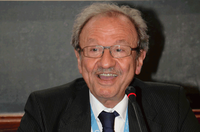 "And that's precisely what countries with emerging economies – including Brazil, China, India and others – have been doing for the past quarter century."
"And that's precisely what countries with emerging economies – including Brazil, China, India and others – have been doing for the past quarter century."
As a result, Palis declared, "we are witnessing a reordering of the world economies." Countries that have invested in science – first in building their capacity in basic science and then in applications of science to address critical societal needs – are now reaping the benefit of their astute policies. "It is no coincidence that countries with strong and growing scientific capacities are the same countries with strong and growing economies," he said.
Palis congratulated the ICTP for the contributions it has made to these efforts over the 45 years. He paid special tribute to ICTP's founder, Abdus Salam, who was also responsible for the creation of TWAS. "Both organizations," he said, "have played critical roles in building good science in developing countries."
In addition, he extended a special thanks to the Italian government which has provided core funding for ICTP, TWAS and the other international scientific organizations that are located in Trieste. "Scientists in the developing world owe a debt of gratitude to the Italian government for its foresight, wisdom and generosity," he said. He also expressed appreciation to the United Nations Educational, Scientific and Cultural Organization (UNESCO) and the International Atomic Energy Agency (IAEA), under which ICTP and TWAS have operated through a tripartite agreement with the Italian government.
"I look forward," Palis observed, "to a strengthening of the relationship between ICTP and TWAS in the years ahead. Together we have accomplished a great deal."
But Palis was quick to add that "much lies ahead and much remains to be done." He stated that some 80 countries can be classified as scientifically lagging countries. "These countries," he said, "are home to 25% of the world's population. Yet they produce less than 1% of the articles published in international peer-reviewed journals." Not surprisingly, the same countries are among the world's poorest.
"The ultimate goal of ICTP," Palis concluded, "has been to shrink the gap between scientifically lagging and scientifically capable countries. It's a goal that is shared by TWAS."
"Reconfirming our commitment to this goal," he noted, "is a fitting tribute to the principles that have guided both organizations throughout their history. And it's a goal that is no less worthy today than it was 45 years ago when Abdus Salam proudly announced the launch of ICTP."
The ICTP conference, Science and Development for a Changing World, will continue through Wednesday, 10 November.

